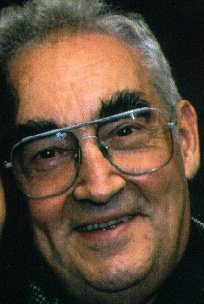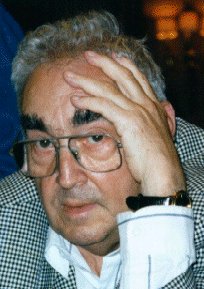Grandmaster Profile: GM Mark Taimanov

While in Wijk
aan Zee in 2001, GM Alex Baburin had the opportunity
to conduct an interview with Grandmaster Mark
Taimanov, which we would like to offer for your
attention here. This interview was originally published in Chess
Today.
Mark Evgenyevich, I
believe that you are
here as a guest?
Indeed, the Max Euwe Association invited
me here in connection with the 100th anniversary of
Euwe's birth. They invited Smyslov and me, but
unfortunately Vassily Vassilyevich could not
come.
Mark Evgenyevich, you saw a lot
of things in chess during your long career. How would you
assess the current situation in our game -
when we have different World champions,
different time controls, etc. What is your
attitude to this?
Every time has its own rules and this reflects on
chess. It is only natural that in the age of
computers, chess has changed as well. In my opinion
chess changed to the worse, but some may think that
chess became better. In my time the creative
and artistic aspects of chess were most important,
while the sporting element came next. Now the
sporting side of chess is prevailing and every
change in the rate of play is speeding up this
process.
Do you think that the quality is suffering?
Yes. First adjournments
disappeared...Adjourned positions gave a lot to the art
of analysis and the theory of the endgame.
Many discoveries were made while analysing
adjourned positions. Then the rate of play became
faster and now there is a tendency to speed it up
even further. This is probably inevitable, but
still regretful... In the 50s and 60s, which I
think was the golden age of chess, Grandmasters
explored chess, they tried to find new strategic
paths and ideas. But it happened that the last
player, who discovered something significant
in the opening theory, was Sveshnikov with his
system - nobody discovered anything considerable
after him.
Maybe the reason is that everything has
been discovered already?
No! I think that possibilities are endless in chess.
But nobody is trying to find them - everyone is
using known recipes... It must be said though that
Kasparov tried and found new ideas in old openings,
like, for example, in the Scotch. When he started
to play it, it became clear that there had been
many hidden opportunities in that opening. But
nobody else seems to be interested in studying
chess now, when the result became more important
than the process. If you think of it, even Fischer
- the great Fischer - did not discover anything,
but just brilliantly interpreted and improved
ideas of players before him.
I cannot agree with all this criticism, as
it seems that now it is just impossible to come up with anything new so early
in the opening. For example, I work with Alexander Morozevich and see
that he is constantly looking for new ideas. And other top players search
for them too, albeit their ideas come at later stage in the game and look
more like improvements.
I like how Morozevich plays - he is not afraid to
take risk, he is a player. But I still think that
it is still possible to find ideas early - again
look at the Scotch and the Petroff Defence. That
opening was regarded as dull and now it became so
popular!

How about the change of people's perception
of the game and image of chess?
It has devalued too. When there were 5-6 main
tournaments a year they attracted huge media
interest. Now there are hundreds of events and many
of them are good, but there is little interest in
the media. In old times Botvinnik, for example,
was a public figure in the USSR and Fischer was the
same in USA. In 1970 when we played in Belgrade in
the match 'USSR vs. The Rest of the World', we
played in a huge hall with 2,500 seats. It was full
and demonstration boards were installed in the
streets, where hundreds of fans could watch the
games and even rain could not distract them.
Of course, then chess players felt that they were
part of something important. Now a chess player is
just a player - he could be stronger, he could
be weaker, but not many people cared. But
there are some good changes too, that now people
can play chess and make a living, can travel
abroad, etc. The game
has become more democratic.
You played against many great players. If you were to name
three of the best players in chess history, whom
would you chose?
As I value the creative side of chess above its other
aspects, for me names of Alekhine, Tal and Kasparov
are most important.
Mark Evgenyevich, thank you very much
for the interview!
You are welcome!
This interview were originally
published in Chess Today.
|


